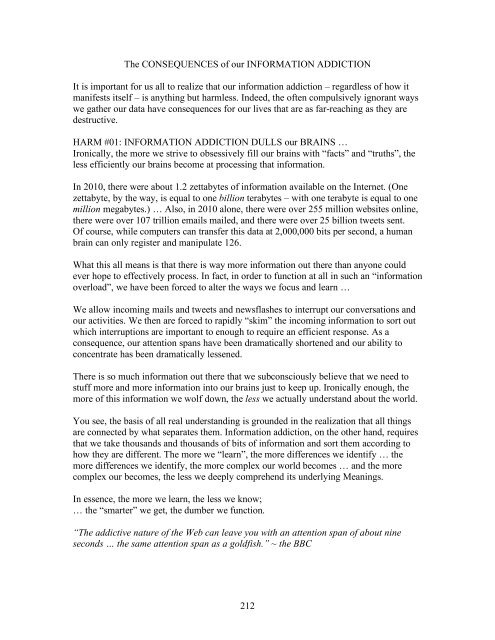Licking the Razor's Edge (2015)
Recognizing the hidden addictions that bind you, … to then set your True Self free
Recognizing the hidden addictions that bind you,
… to then set your True Self free
Create successful ePaper yourself
Turn your PDF publications into a flip-book with our unique Google optimized e-Paper software.
The CONSEQUENCES of our INFORMATION ADDICTION<br />
It is important for us all to realize that our information addiction – regardless of how it<br />
manifests itself – is anything but harmless. Indeed, <strong>the</strong> often compulsively ignorant ways<br />
we ga<strong>the</strong>r our data have consequences for our lives that are as far-reaching as <strong>the</strong>y are<br />
destructive.<br />
HARM #01: INFORMATION ADDICTION DULLS our BRAINS …<br />
Ironically, <strong>the</strong> more we strive to obsessively fill our brains with “facts” and “truths”, <strong>the</strong><br />
less efficiently our brains become at processing that information.<br />
In 2010, <strong>the</strong>re were about 1.2 zettabytes of information available on <strong>the</strong> Internet. (One<br />
zettabyte, by <strong>the</strong> way, is equal to one billion terabytes – with one terabyte is equal to one<br />
million megabytes.) … Also, in 2010 alone, <strong>the</strong>re were over 255 million websites online,<br />
<strong>the</strong>re were over 107 trillion emails mailed, and <strong>the</strong>re were over 25 billion tweets sent.<br />
Of course, while computers can transfer this data at 2,000,000 bits per second, a human<br />
brain can only register and manipulate 126.<br />
What this all means is that <strong>the</strong>re is way more information out <strong>the</strong>re than anyone could<br />
ever hope to effectively process. In fact, in order to function at all in such an “information<br />
overload”, we have been forced to alter <strong>the</strong> ways we focus and learn …<br />
We allow incoming mails and tweets and newsflashes to interrupt our conversations and<br />
our activities. We <strong>the</strong>n are forced to rapidly “skim” <strong>the</strong> incoming information to sort out<br />
which interruptions are important to enough to require an efficient response. As a<br />
consequence, our attention spans have been dramatically shortened and our ability to<br />
concentrate has been dramatically lessened.<br />
There is so much information out <strong>the</strong>re that we subconsciously believe that we need to<br />
stuff more and more information into our brains just to keep up. Ironically enough, <strong>the</strong><br />
more of this information we wolf down, <strong>the</strong> less we actually understand about <strong>the</strong> world.<br />
You see, <strong>the</strong> basis of all real understanding is grounded in <strong>the</strong> realization that all things<br />
are connected by what separates <strong>the</strong>m. Information addiction, on <strong>the</strong> o<strong>the</strong>r hand, requires<br />
that we take thousands and thousands of bits of information and sort <strong>the</strong>m according to<br />
how <strong>the</strong>y are different. The more we “learn”, <strong>the</strong> more differences we identify … <strong>the</strong><br />
more differences we identify, <strong>the</strong> more complex our world becomes … and <strong>the</strong> more<br />
complex our becomes, <strong>the</strong> less we deeply comprehend its underlying Meanings.<br />
In essence, <strong>the</strong> more we learn, <strong>the</strong> less we know;<br />
… <strong>the</strong> “smarter” we get, <strong>the</strong> dumber we function.<br />
“The addictive nature of <strong>the</strong> Web can leave you with an attention span of about nine<br />
seconds … <strong>the</strong> same attention span as a goldfish.” ~ <strong>the</strong> BBC<br />
212


















